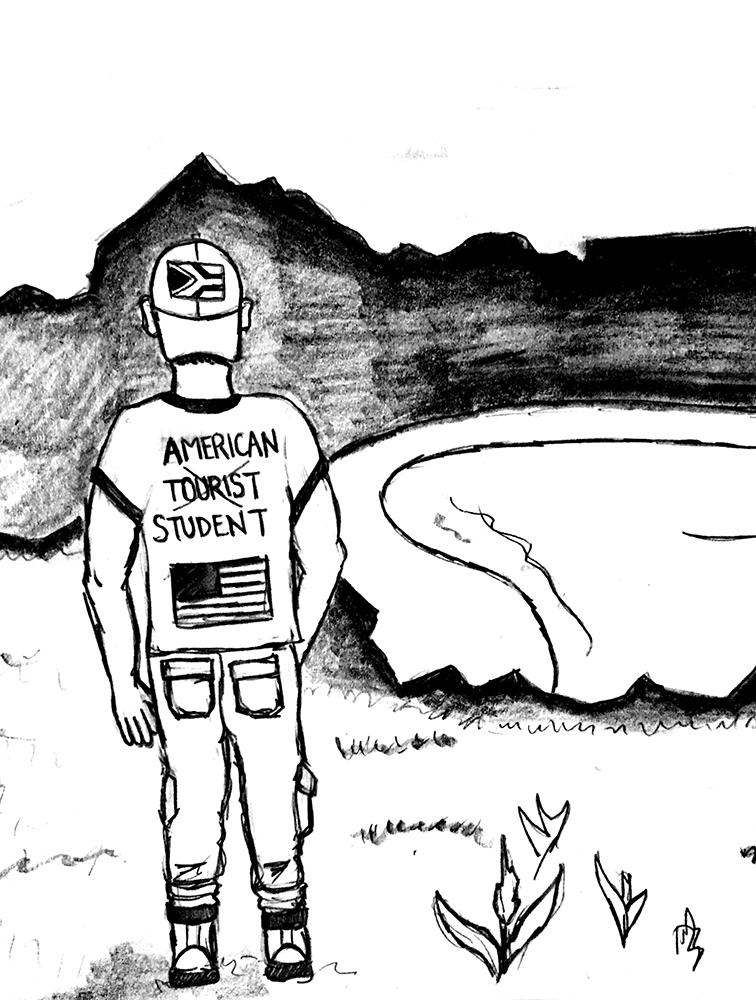 I have lived in Ecuador and am now in South Africa, and in both places, I’ve experienced a full array of commentaries on my American nationality.
I have lived in Ecuador and am now in South Africa, and in both places, I’ve experienced a full array of commentaries on my American nationality.
First, there are the paranoid people in South America who think I’m in the CIA. During my stay in Ecuador this summer, the country erupted in protests after its near-dictator President Rafael Correa proposed a 77.5 percent inheritance tax on the highest income bracket. Anger at his crippling socialist policies, suppression of speech and expression and silencing of the political opposition finally lit a flame of public dissent.
Of course, he and his government wanted to downplay this rare, massive public display of protest, and thus blamed Westerners for its instigation. As much as I’d like to write “organizing a 400,000-person march in Guayaquil” on my resume, I have to give the Ecuadorian people credit where credit is due.
I lived close to the major protest spot in Quito at Parque Carolina and would often frequent it. As a conservative Republican, this was a rare life moment, as the masses in the streets were fighting for an ideological position that was also mine. I was not going to miss out.
The United States State Department and Georgetown University warned strongly against students nearing any protests, but despite government-influenced media reports of violence, the protestors were quite peaceful. I kept a low profile to be safe; I learned the hard way that if I spoke any English, I immediately drew attention from people around me. Sometimes I would speak Spanish with a lisp so as to try to seem like a white Spaniard rather than a white American.
Not everyone hates Americans, though. In Stellenbosch, South Africa, where I’m currently abroad, there are always people excited to meet an American. We are a minority of the students studying abroad here, overwhelmed by Germans and other Europeans. Not only are we small in numbers, but our accents are considered lekker — cool and exotic. I guess beauty is in the ear of the beholder.
I am repeatedly asked, “So, did you think we had lions roaming the streets?” No, but considering the United States obsession with Cecil, I can’t be surprised you asked.
South Africans also regularly try to provoke a presumed American ignorance by asking “So, did you know white people live here?” Yes, yes I did. However, I did not expect to meet so many white students from Botswana, Zimbabwe and Swaziland. Because they make up such tiny minorities in their countries, I feel I must have met all the young white people from South Africa’s neighboring nations by now.
In Ecuador, I regularly talked politics with people when going out to bars or discotecas. As one new lawyer put it, this was his chance to change the world. He said he couldn’t easily move to the United States, but this was an opportunity to share his personal experiences and maybe influence someone who could have future political influence back in the States.
Meanwhile, in South Africa, my African classmates often use the West as a go-to scapegoat when our international relations professor asks tough questions about the failures of the continent. One girl said she believes the United States deliberately tries to sabotage every single deal China makes with African countries, just for the sake of it.
With a long colonial history and the legacy of the Cold War, Africans have every right to call themselves victims and to mistrust the West. Unfortunately, victimization will only ever lead to squandered aid and dependency rather than empowerment and self-sufficiency for African states. But I’ll save that debate for class.
As an American abroad, I carry the responsibility of our country’s foreign policy actions. Whether I voted for the government or not, our nation’s decisions are ingrained in my identity when I’m in foreign countries.
I can defend or at least explain certain actions the Obama administration makes, even though I generally disagree with the majority of them. Unfortunately, I tend to lack a solid defense of our pop culture. If someone reading this has a rational explanation for why so many people on social media are obsessed with cats, let me know.
Until then, I’ll continue taking the heat in pop culture interrogations while you watch your YouTube shows from bed and spoon Nutella out of a jar … or at least that’s what the South Africans are telling me.
Alexander Bobroske is a junior in the School of Foreign Service. Oh The Places You’ll Go appears every other Friday.



















